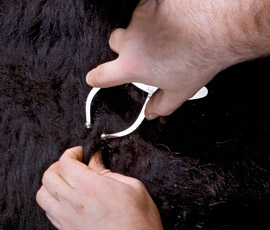Oral TB badger vaccine ‘not ready before 2019’

An oral badger vaccine to tackle bovine TB will not be ready for at least six years, farmers have been told.
British scientists say they are working hard with colleagues in Ireland and New Zealand to produce a licensed oral vaccine.
But Glyn Hewinson, chief scientist at the Animal Health and Veterinary Laboratories Agency (AHVLA), said it would take at least six years for an oral badger vaccine to come to the market and replace the costly injectable Bacille Calmette Guerin (BCG) vaccine.
“The government’s draft bovine TB strategy for England [published in July] suggests an oral bovine TB vaccination could be deployed by 2019, but I think that’s your most optimistic time scale and there’s still lots of research to do,” said Prof Hewinson, speaking at a briefing at the AHVLA headquarters in Addlestone, Surrey.
In the meantime, the professor said he felt “comfortable” with the UK government and Welsh government adopting different strategies on tackling bovine TB, as this would help develop data to influence future decision-making.
Currently, a field trial is under way in Ireland that involves trapping badgers, anaesthetising them and squirting an oral formulation down their throats to create a “proof of principle”, Prof Hewinson said.
However, the next step would involve developing baits to see how well the vaccine would work in a real-life situation where badgers would “eat the bait and be vaccinated”, he added.
“There are formulations showing promise and proof of concept, but there is still quite a long way to go.”
Meanwhile, in New Zealand, scientists have developed an oral BCG vaccine for possums, a key spreader of tuberculosis.
In the UK, experimental trials are ongoing into the development of an oral badger vaccine. But scientists need to generate an animal test certificate to show the safety and efficacy of the experiments before they can progress to field trials.
“They [oral vaccines] might be more practical to use. You don’t have to trap the animals, therefore it may be cheaper, but that’s not guaranteed,” said Prof Hewinson.
“The costs will depend on the dose you require and the number of baits you will need to be deployed per badger.”
An injectable vaccine, BadgerBCG, has been licensed for use on badgers in the UK and is currently being trialled by the Welsh government.
But Prof Hewinson said the cost of deployment of the vaccine was “very high” – between £2,000 to £4,000 per square kilometre – which made it “unattractive for contractors”.
“There are no field trials to show that vaccinating badger reduces TB in cattle, although it is reasonable to assume that,” he added.
Therefore Prof Hewinson said he was keen for volunteer organisations to make use of available DEFRA funding and carry out vaccination in a co-ordinated way to accumulate data “to see how well badger vaccination is working” in the absence of a large-scale vaccine trial.
EU legislation will need to be amended to allow the vaccination of cattle against TB as the BCG vaccine sensitises cattle to the tuberculin skin test, which can lead to positive results when animals are not infected with M. bovis.
Therefore, DEFRA is developing a diagnostic test, known as a DIVA test, that differentiates infected cattle from vaccinated animals.
DEFRA and the Welsh government are working with the EU to change current legislation, but it could take 10 years to achieve trade in vaccinated cattle, according to the European Commission.
“The European Food Safety Authority (EFSA) has been mandated by the EU to provide an opinion on cattle vaccination field trials,” said Prof Hewinson.
“There will be interaction between EFSA and this new independent scientific advisory group, which DEFRA has set up to provide scientific advise and challenge to the design of these field trials. They will oversee all the stages from design, execution and analysis of the data.
“To carry out a field trial, we need the UK’s Veterinary Medicines Directorate (VMD) to grant us an animal test certificate. Trials would then begin, but need to be robust and affordable.”
Last year, bovine TB resulted in the slaughter of 38,000 cattle in the UK, costing taxpayers more than £100m. Pilot badger culls will begin in two southern counties this summer.
Read the latest news on bovine TB and the badger cull
